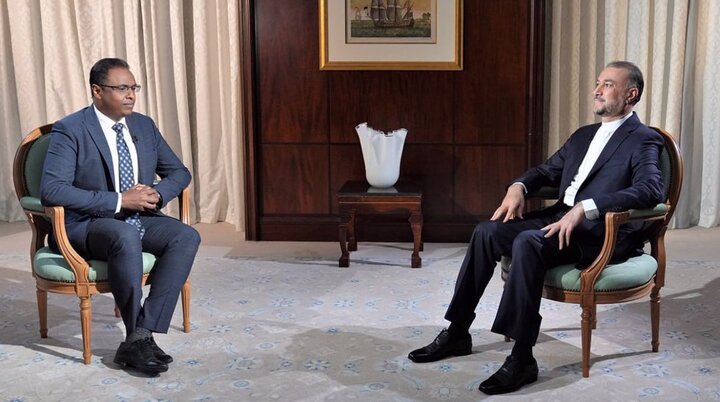Iran (IMNA) - Amir-Abdollahian stressed the importance of transforming the current temporary ceasefire between Israel and the Palestinian Hamas resistance group into a permanent one. Failure to do so, he warned, would result in the region facing new and potentially dire circumstances.
"The Zionist regime and the Americans should be prepared to accept the harsh consequences if they fail to put an end to these war crimes," Amir-Abdollahian stated firmly.
The initial four-day ceasefire in Gaza, which expired on Monday, has been extended for an additional two days. During this period, hostilities between Israel and Hamas have ceased, allowing for a prisoner swap between Palestinians held in Israeli jails and captives under the control of Hamas.
In a recent statement, Amir-Abdollahian expressed that Israel has shown a willingness to continue and expand the ongoing conflict, with full support from the United States, in what he referred to as the "Gaza genocide." He mentioned that Tehran had been informed through intermediaries that the White House has realized that their unwavering support for Israel does not bring them any benefits.
The Iranian diplomat also highlighted the current stance of the US, stating that they now possess the will to put an end to Israeli atrocities by establishing a stable ceasefire, providing humanitarian aid to Gaza, and preventing the forced displacement of the Palestinian population.
Amir-Abdollahian emphasized that despite the comprehensive support of the US and its allies, the Israeli regime has failed to eradicate Hamas over the past six weeks. He acknowledged Hamas as a reality deeply rooted within Palestine and an integral part of the Palestinian resistance. He firmly believed that the fate of Gaza should be determined by the Palestinian people and their resistance.
Furthermore, Amir-Abdollahian claimed that the escalation of the conflict in recent weeks was a natural response from regional resistance forces to the US's military backing of the Israeli massacre of Palestinian women and children. He made it clear that Iran does not have any proxy groups in the region and that resistance movements are driven by their own countries' interests, the preservation of regional security, and the defense of the Arab-Muslim Ummah.
The war on Gaza was initiated by Israel on October 7, following Hamas' Operation Al-Aqsa Storm, which was conducted in retaliation against intensified Israeli atrocities towards the Palestinian people.
According to recent news reports, the ongoing conflict has resulted in a significant loss of life and destruction in the Gaza Strip. Over 15,000 Palestinians, predominantly women and children, have tragically lost their lives, while large areas of the coastal enclave have been left in ruins. Additionally, it is estimated that around 7,000 Palestinians are missing and may be trapped beneath the rubble.
In response to the situation, Israel has imposed a complete siege on the territory, severely restricting access to essential resources such as fuel, electricity, food, and water for the more than two million Palestinians residing there.
Furthermore, the Iranian Foreign Minister has praised Lebanon's Hezbollah as one of the most formidable resistance groups in the region. It has also been reported that the United States and several Western nations have sent 28 messages to Hezbollah in the past six weeks, urging the group to exercise restraint and prevent the further escalation of the conflict in Gaza.
The Foreign Minister emphasized that occupation is an unacceptable and unrecognized practice under international law, firmly asserting that the land of Palestine rightfully belongs to the Palestinian people.
Regarding Iran's stance on the Palestinian issue, the Foreign Minister proposed a political solution involving a referendum among the original inhabitants of Palestine, including Jews, Christians, and Muslims. This referendum would be overseen by the United Nations and supported financially by other governments. Iran believes that providing political support and assistance to the Palestinian people in their struggle against occupation is not only a legal obligation but also a humanitarian, Islamic, and religious imperative.


Your Comment